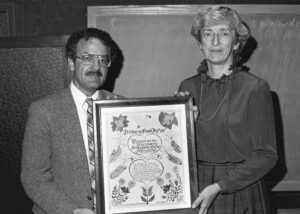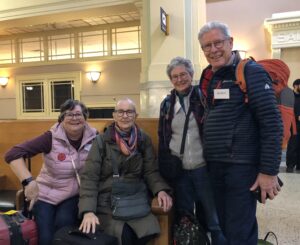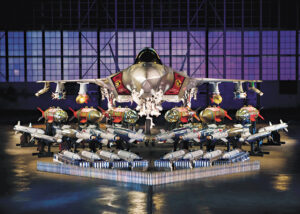Jake Buhler is a man with a different pair of glasses. They reflect a steely determination to pursue peace and help others do the same. “Peace is the lens through which we see everything,” he says.
With that lens, he notices things that others may not. It colours his whole worldview, helping him see the world with different eyes. By nature a quiet man, Buhler looks for opportunities at every turn and on every level to live out his convictions as a peace activist. “Being a peace witness is all-inclusive, it isn’t just one thing,” he says.
Through his rural Osler Mennonite congregation, Buhler has been able to initiate a number of peace projects and engage other congregants in the practice of a peace vision:
- With Osler Mennonite, he has taken part in a community resistance to the building of a nuclear reactor in the late 1970s.
- In recent years, the congregation supported a war resister from the U.S. who went public with his discontent about the American military
- It sponsored a peace concert at which a Hutterite choir from Manitoba told the stories of Hutterites who have suffered for refusing to fight.
- He presented a paper during public hearings in Saskatchewan on whether the province would go nuclear.
- In 2009, the Osler church brought a peace resolution to the floor of the Mennonite Church Canada assembly in Saskatoon.
- Buhler has offered a list of suggestions to help others work for peace, including writing provincial politicians.
In his simple yet convincing way, Buhler points out that his life experiences and early influences have helped him see with this unusual lens, citing such examples as the Prince of Peace, Jesus Christ, family members and early Anabaptist martyrs.
From 1981-87, Buhler worked in Thailand as a regional director for Mennonite Central Committee (MCC). Following that experience, he spent the next 15 years in development work for the Canadian Embassy in Thailand and Vietnam. His experiences there cemented his already firm belief that war is wrong. Looking through his “peace” lens has helped him see some disturbing trends.
“In the last five years, since [Prime Minister Stephen] Harper began, militarism of Canada is increasing,” he says, noting, for example, that fire trucks, police cars and government vehicles are sporting stickers proclaiming support for Canada’s troops in Afghanistan. “Mennonites struggle with having to drive those,” he notes.
He also notices changes in the way Nov. 11 is observed. “The present government has turned Remembrance Day services into active support for militarism,” Buhler argues, while claiming that children are targeted in schools and society in general sees militarism promoted in sports, advertisements, religion and local government. “Militarism has pervaded our everyday life to the point where we don’t even notice it,” he says. “Canada is becoming like the Americans.”
As Buhler offers suggestions to help others live for peace, he stresses the importance of living with integrity. A non-reactionary witness is also important. “Your message has to be more than a protest,” he says, in effect cautioning against emotionalism.
Some see his as a bold witness, though, and he is not “the quiet in the land.” After he put up a sign on his property stating a position for peace, people expressed admiration for his stand. “I wish I had your courage,” they would tell him.
Still, it disturbs him that Mennonites don’t do more to resist the current thinking on militarism. “We have a lot of lazy Mennonites,” he says, suggesting that large organizations like MCC and MC Canada are backing down from confronting the present trend out of fear of losing funding or constituency support.
Yet the label of activist hardly seems to suit this quiet soul. He is hardworking, persistent and in it for the long haul. He is not angry, but quietly determined to make peace his life’s work.








Leave a Reply
You must be logged in to post a comment.